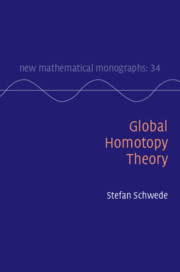Description
Global Homotopy Theory
New Mathematical Monographs Series
Author: Schwede Stefan
A comprehensive, self-contained approach to global equivariant homotopy theory, with many detailed examples and sample calculations.
Language: English
Subject for Global Homotopy Theory:
Approximative price 196.62 €
In Print (Delivery period: 14 days).
Add to cart
Publication date: 09-2018
846 p. · 15.8x23.5 cm · Hardback
846 p. · 15.8x23.5 cm · Hardback
Description
/li>Contents
/li>Biography
/li>
Equivariant homotopy theory started from geometrically motivated questions about symmetries of manifolds. Several important equivariant phenomena occur not just for a particular group, but in a uniform way for all groups. Prominent examples include stable homotopy, K-theory or bordism. Global equivariant homotopy theory studies such uniform phenomena, i.e. universal symmetries encoded by simultaneous and compatible actions of all compact Lie groups. This book introduces graduate students and researchers to global equivariant homotopy theory. The framework is based on the new notion of global equivalences for orthogonal spectra, a much finer notion of equivalence than is traditionally considered. The treatment is largely self-contained and contains many examples, making it suitable as a textbook for an advanced graduate class. At the same time, the book is a comprehensive research monograph with detailed calculations that reveal the intrinsic beauty of global equivariant phenomena.
1. Unstable global homotopy theory; 2. Ultra-commutative monoids; 3. Equivariant stable homotopy theory; 4. Global stable homotopy theory; 5. Ultra-commutative ring spectra; 6. Global Thom and K-theory spectra; Appendix A. Compactly generated spaces; Appendix B. Equivariant spaces; Appendix C. Enriched functor categories; Bibliography; Symbol Index; Index.
Stefan Schwede is Professor in the Mathematical Institute at the Rheinische Friedrich-Wilhelms-Universität Bonn. His main area of expertise is algebraic topology, specifically stable homotopy theory.
© 2024 LAVOISIER S.A.S.




